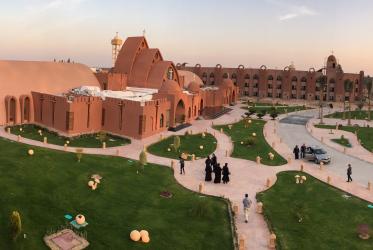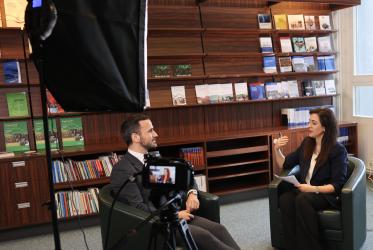7th International Consultation of United and Uniting Churches
Driebergen, The Netherlands, 11-19 September 2002
Information Release 23 September 2002
United and Uniting Churches Call for Unity, Dialogue with Partners
The world-wide family of united and uniting churches, meeting in Driebergen, The Netherlands 11-19 September 2002, has challenged all churches to renew their commitment to visible unity, and called for increased dialogue with mission partners and denominational church structures.
In an honest, self-critical meeting "full of spirit and hope for the future," united and uniting churches explored the inter-relation of unity, mission and identity. Presentations on these topics were complemented by case studies and reports from unions and union processes around the world, workshops on theological and practical issues facing the churches today, and intensive encounters with Samen op Weg (Together on the Way), the church union process in The Netherlands which hosted the meeting. (The process links two Reformed churches and one Lutheran church hoping for full unity by early 2004.)
The meeting brought together representatives of more than forty-five united churches and church union processes, observers from mission partners and Christian World Communions which include united churches, and observers from the Orthodox and Roman Catholic churches.
Opening worship and a closing eucharistic service were held in a local united congregation; daily worship, including challenging bible studies, helped develop the consultation theme, 'With a Demonstration of the Spirit and of Power' (1 Cor. 2:4).
Rather than a conventional report, the consultation issued a "concise, yet substantial" message reflecting the united and uniting churches' distinctive identity and commitments, and inviting a range of partners (theological, missional, material and historical) into dialogue on matters which unite - and sometimes threaten to divide - them.
Participants agreed that a model of unity must be "tangible enough to make a witness to the world, intense enough that those in it recognize their responsibility for one another, costly enough that churches are changed as a result of being in it, and intentional enough that the body of Christ is renewed through the sharing of gifts".
The actual form of unity may vary considerably according to local circumstances, as was emphasized by churches coming from settings as diverse as Zambia, The Netherlands, South Africa, Jamaica, the United States, India, Germany and The Philippines.
But whatever its form, "authentic unity must directly address the issues that divide the human family in our particular settings. A uniting process that concentrates on traditional questions of faith and order without relating them to these issues of human division is responding only in part to the gift and command of unity in Christ".
Participants noted that unity does not automatically lead to more effective mission, and some spoke frankly of their churches' need to be more effective in their witness to the transforming and reconciling power of the gospel. But, they agreed, it is clear that "disunity is an impediment to mission, and that the very fact of being united in one body is a witness to the reconciling power of God".
Mission, which may also take diverse forms according to the local situation, must be understood broadly, "as including kerygma (preaching), koinonia (fellowship), diakonia (service) and leiturgia (worship) - all understood as essential and interrelated dimensions of witness (marturia) to God's reign".
Participants affirmed that the identity of united and uniting churches is rooted in "a 'spirituality of renunciation' that dares let go of cherished identity markers in order to receive a fuller identity through oneness in Christ". This conviction gained special force in light of the church union experience in The Netherlands, where "many local Christians and church leaders with whom we spoke rejoiced in the reality or prospect of shared life...Others, however, expressed discouragement with the length and tedium of the effort".
Recognizing the courage of the Dutch churches in pressing forward, and in light of their own experience of union, participants were quick to affirm the bold insistence of their hosts "that the 'burden of proof' is not on those [churches] who unite but on those who persist in division".
The Consultation message calls for friendly but frank dialogues among united and uniting churches, and between them and a series of partners. The united and uniting churches themselves are asked to reflect together on "issues of division and signs of reconciliation" in their own contexts, and on whether the fact of union has actually strengthened their witness locally.
The united and uniting churches recognize gratefully that their mission partners have sought new and mutually-accountable forms of mission. Nevertheless, "unequal power relations...can be perpetuated," and the message calls for an open dialogue on how "international mission relationships [can] best be shaped, or reshaped, so that they facilitate authentic mission by each church in its own context".
Through their constituent churches, each united church or church union process finds itself related to two or more Christian World Communions. These relationships can be a source of strength, but may invite a continuing denominationalism within a united church, or hamper efforts towards union. The message calls for direct, open conversations on these sensitive - and potentially controversial - issues.
In their life and work, participants affirmed, the united and uniting churches are "longing to be a sign, to both church and world, of the power of the gospel to unite that which is divided and to reconcile that which is estranged. Together they hope to experience, and to be, truly 'a demonstration of the Spirit and of power'".
The consultation was the seventh in a series organized by the Faith and Order Commission of the World Council of Churches, which promotes theological dialogue and common action among the churches on issues which divide them. It was supported by the London-based Council for World Mission, which promotes new models of mission based on just sharing of resources among churches.
For further information contact: Rev. Dr. Tom Best, Faith and Order, World Council of Churches, 150, rte. de Ferney, 1211 Geneva, Switzerland, telephone +41 22 791 6335, fax +41 22 791 6407 or +41 22 710 2452, email WCC Contact. The Consultation Message will also be available at the WCC website.
Background
United churches are those formed from unions across or within confessional families (most often involving Reformed, Congregationalist, Lutheran, Methodist, Disciples, Anglicans, and occasionally Church of the Brethren and others). The earliest union was formed in about 1817 in Germany; the most recent in 2000 and 2002. United churches have pioneered in overcoming several historic points of division among the churches, for example over infant and believers' baptism, and (where Anglicans have been involved) over the office of bishop. While very diverse, the united churches share a commitment to make unity both visible and effective in their lives.
Uniting churches are those moving towards union. In some contexts they are pursuing the classic model of structural integration of the divided churches to form a single ecclesial body. In other contexts churches are exploring other ways, such as covenant relationships, of making their unity in Christ visible and convincing, ranging from common worship to intensive partnerships for mission and service, to joint parishes. The next unions are forseen for 2003 in India and 2004 in The Netherlands.
(Some already-united churches identify themselves as "uniting" to stress their commitment to further union, an example being the Uniting Church in Australia).



